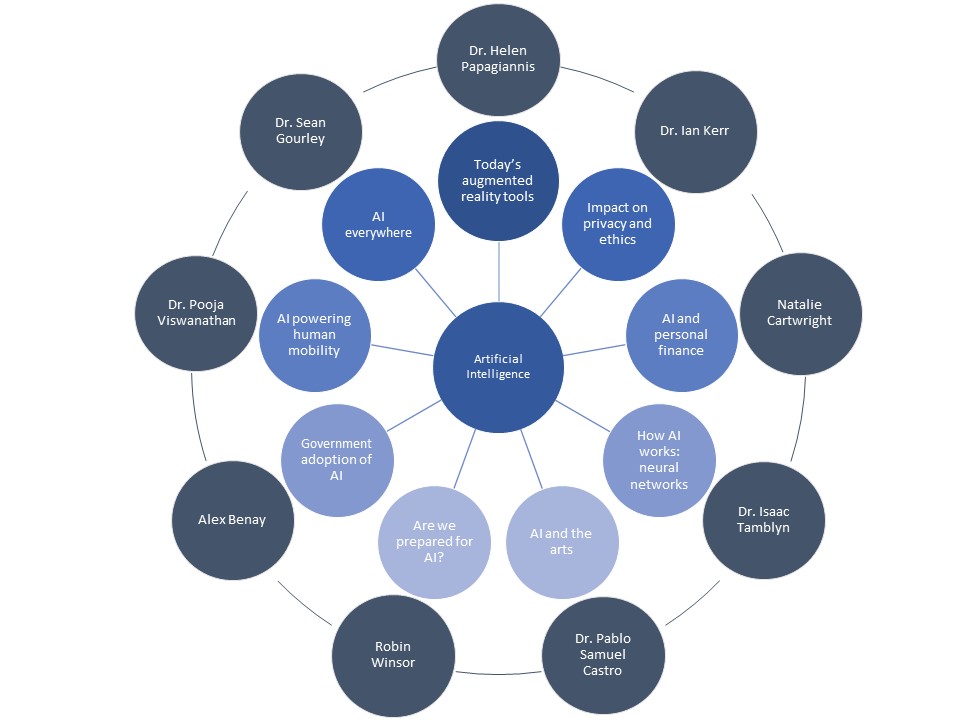One of the most burning issues in technology: the use of AI and automation
Contributed by: Alex Bushell | Manager, Strategic Policy
Every year, the CANARIE Summit brings together thought leaders in government, academia, and the private sector, for an in-depth analysis of a specific technology, its applications, and their social and political impact.
This year’s Summit, held at the beginning of October at the National Arts Centre in Ottawa, focused on one of the most burning issues in technology at the moment: the use of AI and automation.
- Dr. Helen Papagiannis kicked off the Summit with a journey into the future of augmented reality. Helen is the author of Augmented Human, in which she writes about the use of technology to “shape the new reality.” While the most famous example of augmented reality may be the Pokemon Go gaming app, there are lots of uses of visual augmentation in industry, such as airplane engine maintenance training. However, it is not just visuals that can be augmented – for example, Metacookie uses a combination of augmented vision and smell to make plain cookies taste like your favourite flavour.
- Dr. Issac Tamblyn of the National Research Council took us on a deep dive – including calculus – into how neural networks (the foundational technology of AI) work, specifically in relation to his work in thermodynamics, but also on a broad range of applications such as the games Go and chess.
- Natalie Cartwright, co-founder of Finn AI, spoke about the role that AI and chatbots can play in providing financial services to underserved communities. Given that many of us are quite sensitive about our finances, chatbots provide a platform for providing necessary information and context that can support better financial decision-making.
- Google’s Dr. Pablo Samuel Castro used the opportunity to plug his jazz band, which features an AI algorithm on bass! Pablo has used AI to produce both music and lyrics, and jammed live on stage with his AI algorithm. Most importantly, he pointed out that the role of AI in music is to empower musicians, not to replace them.
- To close off Day 1, Alex Benay, the Government of Canada’s Chief Information Officer gave us an insight into the Government’s use of AI. This includes small-scale, agile procurements to allow Canadian companies to trial their tools within the public service.
- Dr. Sean Gourley of Primer opened Day 2 with a broad conversation on the uses of different types of modeling, including Bayesian modelling in sports betting, and the use of unsupervised algorithms to find clusters in basketball positions or interventions in regulatory proceedings. Sean’s position was that we need to be ready to respond to automation even though it may occasionally create significant messes, and that AI works best when it is combined with human intuition and knowledge.
- Dr. Pooja Viswanathan, the CEO of Braze Mobility, gave an overview of her journey in introducing smart wheelchairs to market, and her experience in taking a leap from academic research to starting a business. Pooja reminded the audience that sometimes we have to remember to put the user at the center of automation – and often people want to retain their autonomy, without giving in to full automation.
- Dr. Ian Kerr, the Canada Research Chair in Ethics, Law and Technology at the University of Ottawa, gave the audience a quick lesson in law and philosophy, as they relate to privacy. Traditionally in North America, privacy laws require a human to view someone’s data in order to be considered a breach. However, epistemologists argue that when thinking about privacy, we should think more in terms of cognizers (those who perceive or become aware of), whether human or otherwise; as such, an algorithm can breach your privacy even if no human has ever viewed it.
- Finally, Robin Winsor, the CEO of Cybera, the Alberta Research and Education Network, prepared the audience for a future with AI, drawing on the presentations made throughout the two days. While the future with AI is not necessarily bleak, Robin pointed out that it may require significant changes in social policy to protect against changes in employment that are brought about by automation.
As always, the questions and engagement with the speakers from the attendees was great, and many of the issues raised continued as conversations in the coffee breaks. Very early planning is already underway for our 2019 Summit, and although I may be biased, I think you should definitely make room in your calendar for it once the date is announced!



